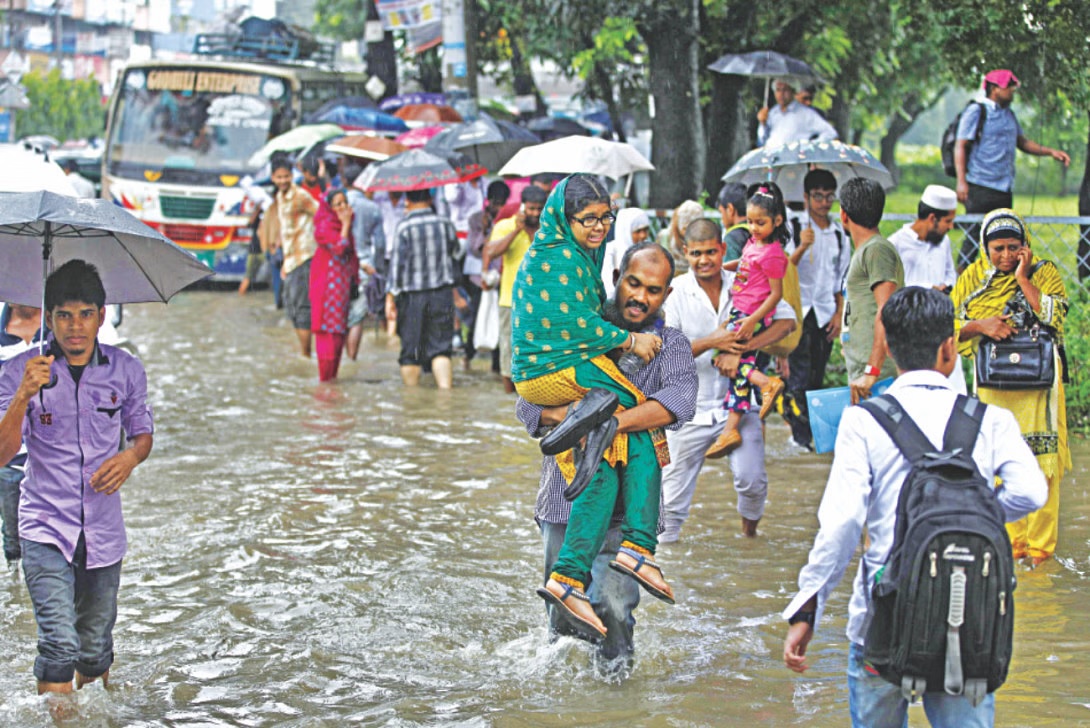Five and a half years ‘gone with the wind’

There are many ways for a nation to measure its decline. Some count the number of young men leaving through airports with one-way tickets. Some tally the failing bridges and half-built flyovers that stand like wounded dinosaurs across the urban landscape. And some, like Bangladesh, count in breathless coughs, in shortened lives, in the invisible yet suffocating arithmetic of particulate matter. According to the latest Air Quality Life Index (AQLI), Bangladeshis are losing 5.5 years of life expectancy on average to toxic air. Not to war, not to famine, not to some biblical plague of locusts, but simply to the very act of inhaling. Breathing itself has become hazardous, an occupational risk of living in one's own homeland.
It is a sobering revelation, though hardly a surprising one. Anyone who has walked the streets of Dhaka, especially during winter, knows the acrid tang that often stings the throat. But to see its effect quantified—five and a half years lopped off our collective timeline—gives it the weight of tragedy. It is as if Father Time himself were being mugged at the crossroads of Farmgate, his hourglass shattered into smog.
The AQLI report is merciless in its detail. Every single person in Bangladesh breathes air worse than both the World Health Organization's (WHO) "ideal" and our own "tolerable" standards. Even Lalmonirhat, the country's least polluted district, inhales air seven times more toxic than what global doctors prescribe. Dhaka's residents could gain nearly seven years of life if PM2.5 levels were cut to the WHO limits. In Gazipur, the figure climbs to a staggering 7.1 years. Here, years are currency, and dirty air is the most ruthless tax collector.
If this were a Shakespearean play, the brick kilns would make excellent villains, puffing and wheezing like Macbeth's witches, chanting "Fair is foul, and foul is fair" while filling the skies with soot. These kilns, often illegally operated, alone account for 58 percent of Dhaka's air pollution, despite repeated promises of regulation. The government's new declaration of Savar as a "degraded airshed" and the ban on certain types of kilns seem a promising yet eventually doomed step in the right direction, given the many interlinked challenges involved and our own history of policy failure.
There is a peculiar irony here. Smoking, according to the same AQLI study, reduces life expectancy by two years; malnutrition by 1.4 years. Yet, both are trumped by the air itself, which silently robs us of more years than the cigarette, the empty stomach, or the polluted well. Breathing has become more lethal than smoking. How does one quit air? This slow poisoning or suffocation has been long in the making. Between 1998 and 2023, PM2.5 levels in Bangladesh rose by 66 percent, stealing 2.4 years of life expectancy in just a generation. What wars, dictatorships, and cyclones could not take, dust and soot accomplished with quiet efficiency.
During these years, governments, like tragic heroes, oscillated between Hamlet's paralysis and Don Quixote's misdirected battles. Laws were passed, plans were drafted, and promises were made to plant trees, modernise industries, and shift to electric vehicles. But enforcement remains as elusive as Banquo's ghost. The 2019 law barring kilns near residential areas might as well be a bedtime story told to comfort anxious children. And when illegal kilns are finally ordered shut by the High Court, one wonders how many will rise again under new disguises.
Citizens, too, have played their part in this tragicomedy. With the resignation of Eliot's Prufrock, they stroll "through half-deserted streets," inhaling smog as if it were destiny. Social media timelines are full of complaints about the AQI, yet many ride unregulated buses, burn waste in back alleys, and vote for leaders who treat environmental laws as optional. "I will think about it tomorrow," says Scarlett O'Hara in Gone with the Wind. Dhaka's citizens, it seems, have adopted the same mantra. Tomorrow, however, is the one thing we are steadily running out of.
But even in tragedy, there lies a possibility if we believe in change. Consider Singapore, once plagued by vehicular chaos, now an exemplar of emission control. Consider Mexico City, which drastically reduced smog through policy and enforcement. These cities did not wait for divine intervention. They acted. Why should Dhaka or Gazipur not dream the same?
The battle here is not merely technological; it is also moral. Air, that most basic of commons, has been privatised by the few at the cost of the many. Brick kiln owners profit while children suffocate. Old vehicles run on the fuel of corruption. Construction companies build towers, but not conscience. It is, in essence, a heist—life expectancy robbed from the poor to enrich the few.
In the AQLI's grim arithmetic, 5.5 years are already gone. But arithmetic also allows for addition. Cleaner fuels, stricter enforcement of regulations, proper urban planning, and genuine political will—these could return years to our lives. But as always, the only question that remains is whether we will choose to act in proportion to the gravity of the challenge before us or let inertia continue to destroy our lives and future.
H.M. Nazmul Alam is an academic, journalist, and political analyst. He can be reached at nazmulalam.rijohn@gmail.com.
Views expressed in this article are the author's own.
Follow The Daily Star Opinion on Facebook for the latest opinions, commentaries, and analyses by experts and professionals. To contribute your article or letter to The Daily Star Opinion, see our guidelines for submission.




 For all latest news, follow The Daily Star's Google News channel.
For all latest news, follow The Daily Star's Google News channel. 
Comments